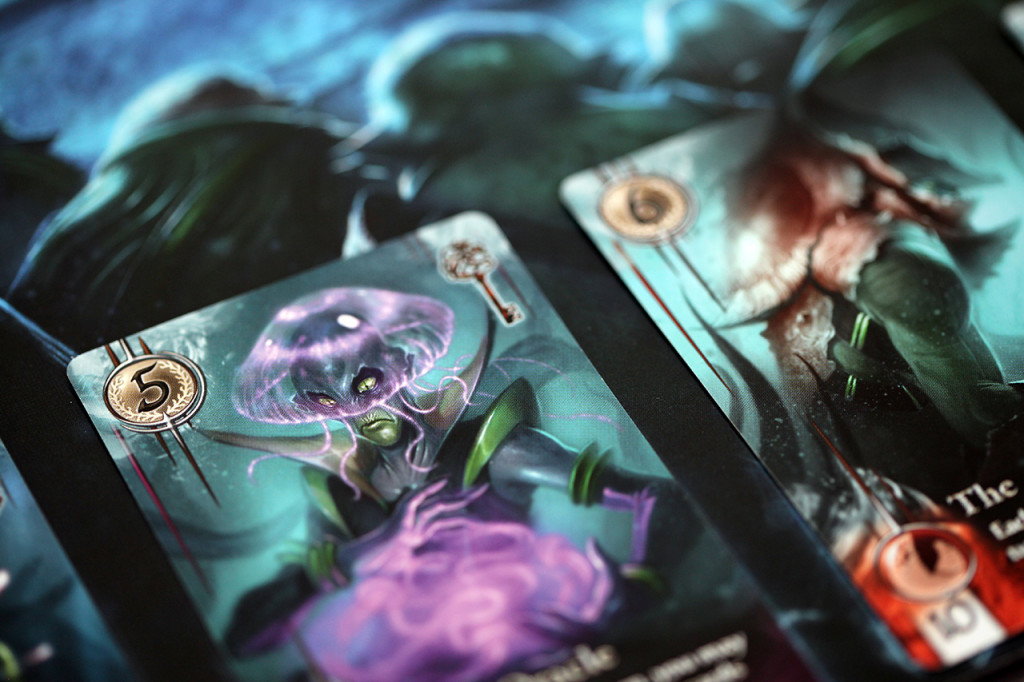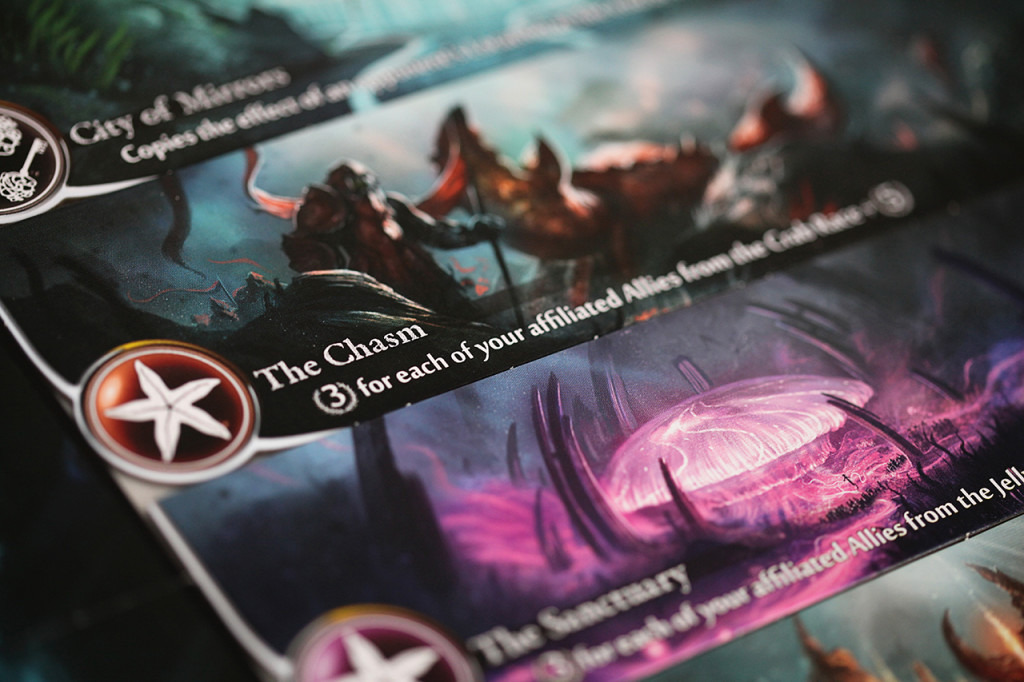As I stand on the beach, where the water meets the sand, I often wonder about the vast depths of the world below us. What secrets could possibly hide within the crushing pressure and infinite darkness. But alas, I wonder no more…because Bruno Cathala knows what’s up. And, yes, it does involve anthropomorphic sea creatures wearing jellyfish hats.
The Game
Abyss is a set collection game for 2-4 players from designers Bruno Cathala and Charles Chevallier and published by Asmodee Editions. In Abyss, players will be looking to gather allies and use them to recruit powerful lords from the Abyssal Council. These Lords will then use their clout to hold strategic positions around the city and hopefully provide you with enough influence to become the ruler of the sea!
The first thing to be said about Abyss is that it’s nice to look at…er…great to look at. Beautiful? Stunning. Awesome. Really, really, really, stupidly good looking. I can think of no other way to start this review than to mention that Abyss looks fantastic. Did I mention that? Anyway, the question that you have to ask yourself after playing is whether or not you actually enjoyed the game, or if you were just sucked in by Xavier Collette’s so-good-it-might-be-an-example-of-legitimate-magic artistic talent.
The inner workings of the game are actually delightfully straightforward (mostly). You can take one action on your turn and you have three available options. Exploring allows you to gather ally cards through a drafting mechanic that allows your opponents first crack at what you discover, but they must pay you for the privilege. Players can pass however, and keep digging in hopes of finding something more fitting. Cards that have been passed over are transferred to the Council at the end of the action, where they are sorted into their respective factions. Requesting support from the council allows you to take one of those accumulated stacks into your hand, giving you more bang for your buck, but at the cost of variety. The cards in your hand can be used to recruit a Lord from the court, where 6 prominent members of society are just waiting to be swayed and bought off. Each Lord has a cost which varies in both strength and faction requirements, forcing you to spend cards from either specific, or a variety of factions, and of a certain total value, to win him or her over. Doing so gives you control of the Lord, their victory points, and any special abilities they may have.
This is the basic framework of Abyss, and on its own, there’s nothing overwhelmingly positive or negative about it. The use of opponent-first drafting during exploration is a nice feature that keeps players engaged and helps to counteract some of the luck involved in random card drawing. Having the secondary option of gaining all of the leftovers from the council instead is also nice, as it allows you to gain a larger portion of cards for the same price. These are well-considered features, yes, but not standout. It’s the extra bits of lagan that help to make Abyss worth more consideration.
Mini-Mechanisms Save the Day
I mentioned the victory points associated with each lord card, but this is only one of four different ways to score in Abyss. Within the exploration deck, there are 6 monster cards that are tied to an accompanying Threat Track. Each time one of these monsters is encountered while exploring, the active player (and only that player) has the choice to either fight the creature or pass. Passing causes the Threat Track to advance by one, which increases the potential reward for fighting a future monster. Choosing to fight allows you to take the reward present on the corresponding space of the track, which can vary between a combination of keys, pearls, and monster tiles (worth a hidden value of VP at end game), but you won’t have the opportunity to gain an ally card this turn. This introduces the choice between fighting monsters for an immediate gain, passing in hopes of increasing the reward and fighting later, or trying to get the allies you need from the exploration deck. It’s a small but delicate choice because no matter what you do, the opportunity cost of that decision is likely a boon to your opponents.
Once you have the allies needed to buy a Lord, you’ll spend those cards, sending them to the discard pile to be encountered again on a later exploration action. Not all of them are sent there, though, as the lowest card that you spent on gaining the Lord will be added to your play area for end of game scoring. This introduces another decision point, one that has you considering whether or not to overpay for a lord, as while the lowest ally is the one added to your collection, only the highest from each faction will be counted at the end of the game. It breaks the common perception that paying as little as possible is the most efficient choice. This is coupled with the fact that pearls, the secondary in-game currency, can be used to supplement the value (but not the variety) of your allies when purchasing Lords. Interesting options unfold around this, allowing players to spend fewer cards and retain more purchasing power for later turns.
With the support of various Lords, you can also acquire control of locations throughout the city. Locations are an important additional source of victory points, but they come at the cost of keys, which represent power within the region. Keys can be provided by certain lords or be acquired by fighting a monster, and once you have three keys they must be immediately spent on a location. These locations have a number of different permutations that award victory points based on the different Lords and allies you have under your control; however, they also negate the ability of any Lord that provided a key to gain access to that location. It’s another check put in to balance the strength of the powerful Lords.
If They’re All Overpowered, Are Any of Them, Really?
As you dive further into Abyss, you’ll likely stare wide-eyed at some of the cards, as the abilities of the Lords are extremely powerful. Options include a mandatory 6-card hand limit for all opponents, free location tiles, a constant flow of pearls each turn, and being able to grab two stacks of cards from the council. Those are just 4 examples of the 35 different options you may come across while playing. It’s difficult to say whether or not the strength of these powers are problematic, as there are most certainly safeguards in place to balance their advantages. The most powerful Lords are often counterbalanced with higher costs, lower victory point values, or the reward of a key. While keys lead to location tiles, they can also result in deactivating those Lord’s abilities once three are under your control, leading you to question if recruiting that last key-bearing Lord is really worth it at this point! I think, on the whole, the total set of Lords is well-balanced and will provide all players their own moments of glory. On the other hand, though, is the possibility for the randomization of the Lords to contribute to an unbalanced game state. Yet, on the gripping hand, one can always argue that it’s your responsibility as a player to keep your opponent from getting those combinations in the first place! Overall, the game moves quickly, and there are counters enough such that “over-powered” combos typically don’t thrive for long.
[su_custom_gallery source=”media: 10318,10319,10320″ limit=”3″ link=”lightbox” width=”230″ height=”230″ title=”never”]
Is it safe to swim?
Having played Abyss 10+ times, across the full range of player counts, I feel comfortable in saying that this game is largely a success with our group. While our individual rulings will specify to what degree, the consensus seems to be that Abyss has depth in strategy and decision making underneath all of the chrome. It is an easy criticism to say that Abyss is largely over produced, and at times it’s hard not to consider the nice plastic pearls, oversized board, and chunky cardboard tokens as being there to justify the price tag, as opposed to the other way around. It’s a simple set collection card game, without a doubt, but one that combines a number of nice elements to create an engaging experience again and again.
Abyss oozes theme, personality and aesthetic appeal that make it hard to resist on first look. Fortunately, it then follows up with enjoyable gameplay that offers variation in decision making and player interaction.
League Ruling
Kelly B!
I have lost this game more often than I’ve won it, which is often off-putting as far as my game preferences go, and there is no question that I would play it every game night if someone else wanted to. You might have gathered this from the above review, but the game is gorgeous. Seriously. And the theme is really fun: while the lords are all quite lordly in their card portraits, they’re also sometimes pretty silly (i.e. jellyfish hats). Sometimes it is frustrating when you just can’t seem to get the allies that you need or it feels like everyone is recruiting the lords you want just before you get the chance to recruit them. Overall, though, the game has enough other scoring mechanisms and play options that you don’t feel totally left behind. Similarly, I don’t believe I’ve played any single game of Abyss in which I felt like someone was super overpowered based on the lords they had recruited – I have found that the deck of lords is balanced enough that even if a group of really powerful lords comes out at once, the next group is still usually able to make up for it (whether with keys or with brand new excellent abilities). This is absolutely a game to check out, add to your collection, play every weekend, etc!
Smee’s Two Pence
I’ve won every game of Abyss that I’ve played, up until the point that I actually mentioned the fact before a game, and thus lost horribly in accordance with the laws of reality. Anyway, that aside, this is a nice, medium-weight game that sets up and plays well with little fuss, and is tactical enough for me to enjoy throughout a number of plays. This feeling stems from the humble exploration action, the one that I consider the heart of the game. Here you’re confronted with a press-your-luck system where you must offer your opponents the right of first refusal on the cards you draw, potentially giving them the allies they need, but enriching yourself in the process. Additionally, given that any allies that are passed over end up in the council for claiming en-masse, you need to carefully balance what you’re leaving behind versus what you’re trying to gain for yourself. Finally, I know there’s been plenty of to-do over the artistic side of the game, but really, when is the last time you saw a board game released with variant covers?
 Dan
Dan
Lets get the art out of the way first because its predominantly an area where few disagree. The artist’s portrayal of the underwater world is beyond stunning. I mean mind-blowingly awesome. However, while staring in awe its easy to lose sight of what the game actually is; Abyss is a simple set collection game. The theme is unique but its stretched integration into the mechanics failed to draw me in completely. I am a mechanics first kind of guy but with the amazing production quality and artwork I was hoping to be whisked away to a magical underwater world; in reality, it felt more like being whisked away to…Delaware (Hi, I’m in Delaware).
My biggest issue is how slow it escalates to the engaging part of the game play. Even the cheapest lord card (if available) for purchase will require that you go around the table exploring/gathering multiple times and even then you aren’t guaranteed to get what you want/need. The game does not really hit its stride until about round 5 or 6. Once the game picks up, it flows well and provides a number of choices to keep your attention. I just wish it would get to that point more swiftly.
Abyss revolves around the press-your-luck explore/auction mechanism which is interesting in theory but in practice it brought about mixed feelings. While it technically keeps everyone involved in between turns, something I applaud and wish more games would attempt, its extremely easy to be priced out of the auction due to the restrictive economy or just draw into nothing of use. On the other hand, I do like the fact that while pressing your own luck you must also consider the benefits to your opponent(s). An interesting tension but typically more frustrating than not due to the extreme luck factor.
As Matt mentioned, there may seem to be an imbalance in the lords and locations during your first few plays. With repeated plays this will fade as you realize that everything is generally “overpowered.” Games are close due to the fairly tight economy although, from my experience, you will typically be in a commanding position if you are the one who has reached seven lords first. It’s up to you to recruit well and negate your opponent’s ability to recruit better. As for the locations, I don’t want to say that they seem superfluous but I would like to see them play a more integral part in the overall game. You can win this game without obtaining a single location. There are a number of other ways to score points in Abyss but you would think that influencing locations in a game themed around influencing locations would be more consequential. This comes back to the loosely tied theme and I think it’s something that an expansion could remedy.
All in all, I find Abyss to be a good game, not a great one. It’s not a game I will actively search out on game night but I will certainly not refuse if it’s put on the table. It was actually my most played game in 2014; mostly due to its popularity among the rest of our group for its simple rule set and relatively quick game play. There is nothing, outside of the art, that will blow your mind; it’s a simple set collection game with a few novel barnacles attached. It will be staying in my collection, but I would definitely caution you to try before you buy.









